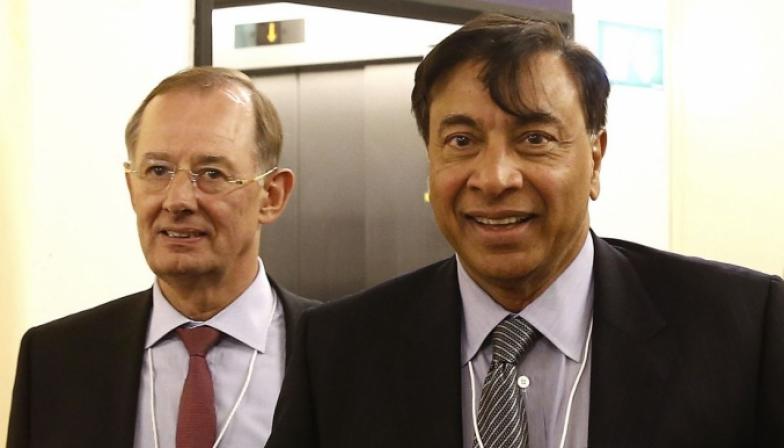ArcelorMittal, the world's biggest steelmaker, hasn't paid a dividend for the past couple of years because of a toxic combination of debt, massive losses and overcapacity. So its decision to reinstate the payout on Wednesday is an important signal.
The payout's very modest size suggests chief executive Lakshmi Mittal has shed his fondness for debt but not a penchant for empire-building. Once-bitten shareholders may be wary of a billionaire who still wants to live a little.
Shareholders will receive only $0.10 a share for the 2017 year financial year, which equates to a 0.3 percent yield and will cost the company only about $100 million by my calculation. 1 Having generated $4.6 billion in net income last year (the most since 2008, according to Bloomberg data), $1.7 billion in free cash flow and cut net debt to about $10 billion (1.2 times ebitda), the steelmaker could afford to be more generous. Analysts were expecting the dividend to be more than double what's been offered.
What a difference a couple of years makes. Such was ArcelorMittal's mess in 2016 that it was forced to go cap in hand to shareholders for $3 billion in capital. Investors who bought around that time have done very well though. From a February 2016 nadir, the stock has returned almost 400 percent.
China has started to cut steel capacity, stemming a flood of cheap exports. Europe and the U.S. have imposed import tariffs to protect domestic steelmakers. (ArcelorMittal produces on both continents). And, of course, the global economy is suddenly firing on most cylinders again. ArcelorMitttal's volumes and pricing have improved.
The company says it remains committed to deleveraging and once net debt has dropped to $6 billion it will return "a portion" of yearly cash flow to shareholders. Some will be disappointed by the vagueness of that statement. True, it's pointless to return large sums to shareholders when times are good only to find yourself short when the economy deteriorates. But dividends are an important restraint on management.
Not long after Mittal's $36 billion takeover of Arcelor in 2006, steel shipments collapsed and the merged company found itself with as much $32.5 billion in net debt. It has spent most of the intervening years cutting costs and closing plants. Asset writedowns and goodwill impairments have totaled almost $13 billion over the past decade, according to Bloomberg data.
Hence, Mittal is demanding a lot of investor patience when he offers a token dividend and simultaneously announces a $1 billion increase in capital expenditures for this year. He may be right about opportunities to deploy capital profitably in the current steel environment. But shareholders won't have forgotten that his investments haven't always panned out, nor how quickly global economic conditions can sour.
The sooner Mittal gets back to paying a dividend that properly rewards long-standing investors for some sleepless nights, the better.



